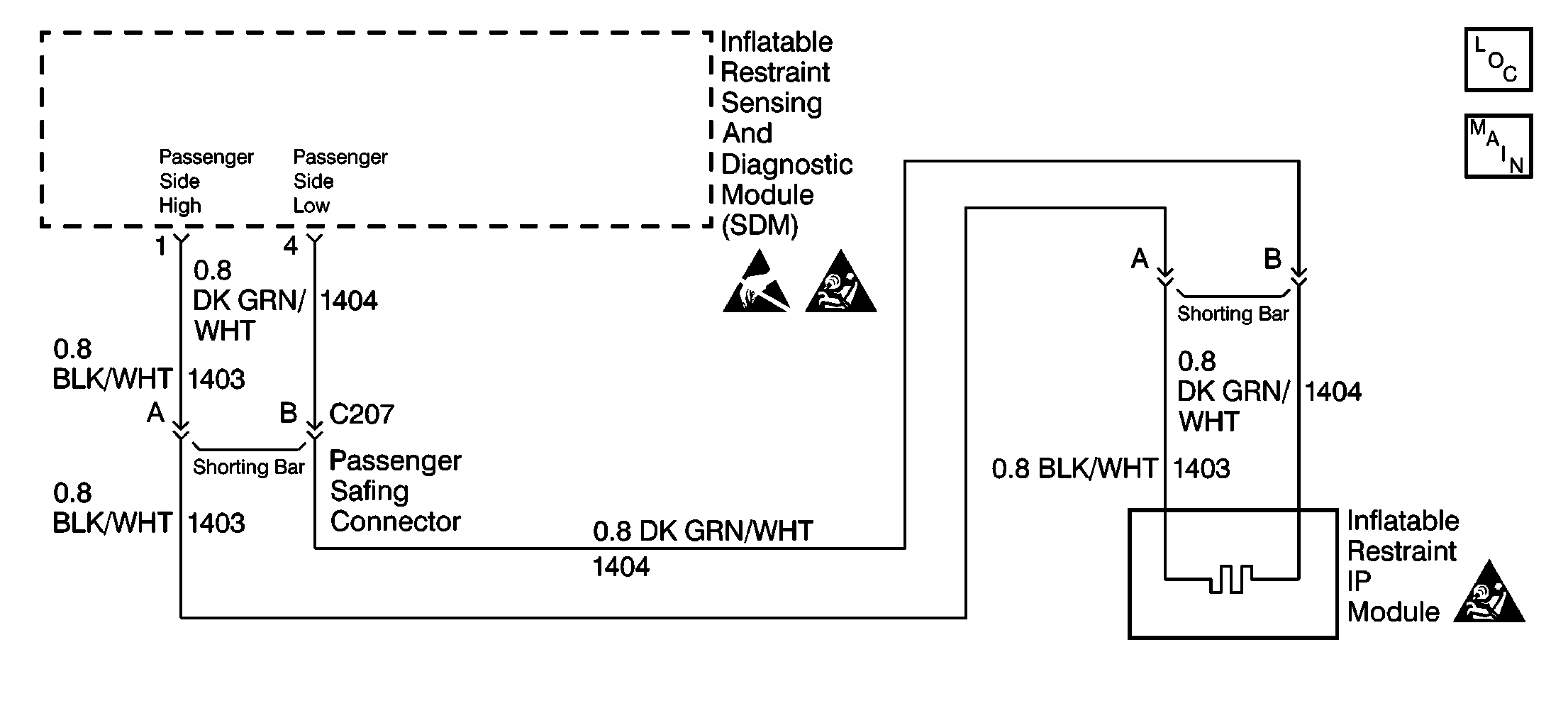
Circuit Description
When you first turn the ignition switch to the RUN position, the inflatable restraint Sensing and Diagnostic Module (SDM) performs tests to diagnose critical malfunctions within itself. Upon passing these tests IGNITION 1, 23 VLR and the deployment loop voltages are measured to make sure they are within their respective normal voltage ranges. The SDM monitors the voltages at DRIVER SIDE LOW terminal 3 and PASSENGER SIDE LOW terminal 4 to detect shorts-to-B+ in the inflator module circuits.
Conditions for Setting the DTC
| • | The voltage at DRIVER SIDE LOW terminal 3 is less than 4.8 volts. |
| • | The voltage at PASSENGER SIDE LOW terminal 4 is more than 4.8 volts for 500 milliseconds. |
The CONTINUOUS MONITORING test checks for this DTC. This test occurs when IGNITION 1 is within the normal operating voltage range.
Action Taken When the DTC Sets
| • | The SDM sets a Diagnostic Trouble Code. |
| • | The SDM turns ON the AIR BAG warning lamp. |
Conditions for Clearing the MIL/DTC
| • | Current DTC |
| The voltage at PASSENGER SIDE LOW terminal 4 is less than 4.8 volts for 500 milliseconds. |
| • | History DTC |
| - | You issue a scan tool CLEAR CODES command. |
| - | Once 250 malfunction free ignition cycles have occurred. |
Diagnostic Aids
A short-to-B+ in the inflatable restraint IP module circuit can cause an intermittent condition. Inspect CKT 1403 and CKT 1404 carefully for cutting or chafing. Wiring pigtail damage requires replacement of the inflatable restraint IP module. The diagnostic table directs the technician to note the entry value of PASSENGER SENSELO. Comparing the value of PASSENGER SENSELO can be helpful in determining if an intermittent condition exists.
When measurements are requested in this table, use the J 39200 DMM with the correct terminal adapter from the J 35616 Connector Test Adapter Kit. When an inspection for proper connection is requested, refer to Testing for Electrical Intermittents in Wiring Systems. When a wire, connector or terminal repair is requested, use the J-38125 Terminal Repair Kit and refer to Wiring Repairs in Wiring Systems.
Test Description
The numbers below refer to the step numbers on the diagnostic table:
-
This test determines the passenger side low voltage measured by the inflatable restraint Sensing and Diagnostic Module (SDM).
-
This test isolates the malfunction to one side of the inflatable restraint IP module yellow 2-way connector.
-
This test determines whether the malfunction is due to the inflatable restraint IP module or the module jumper.
-
This test determines whether the malfunction is in CKT 1403.
-
This test determines whether the malfunction is in CKT 1404.
Step | Action | Value(s) | Yes | No |
|---|---|---|---|---|
1 | Was the SIR Diagnostic System Check performed? | -- | ||
Has the PASSENGER SENSELO been read and recorded on the repair order? | -- | -- | ||
Is PASSENGER SENSELO more than the specified value? | 4.8 V | |||
Is PASSENGER SENSELO more than the specified value? | 4.8 V | |||
5 |
Are the repairs complete? | -- | -- | |
6 |
Are the repairs complete? | -- | -- | |
Is the measured voltage less than the specified value? | 1.0 V | |||
8 |
Are the repairs complete? | -- | -- | |
Measure the voltage on the SDM harness connector from terminal 4 to terminal 6 (ground). Is the measured voltage less than the specified value? | 1.0 V | |||
10 |
Are the repairs complete? | -- | -- | |
11 | Reconnect all the SIR system components, make sure all the components are properly mounted. Have all the SIR components been reconnected and properly mounted? | -- | -- | |
12 | Clear all the SIR DTCs. Have all the SIR DTCs been cleared? | -- | -- |
